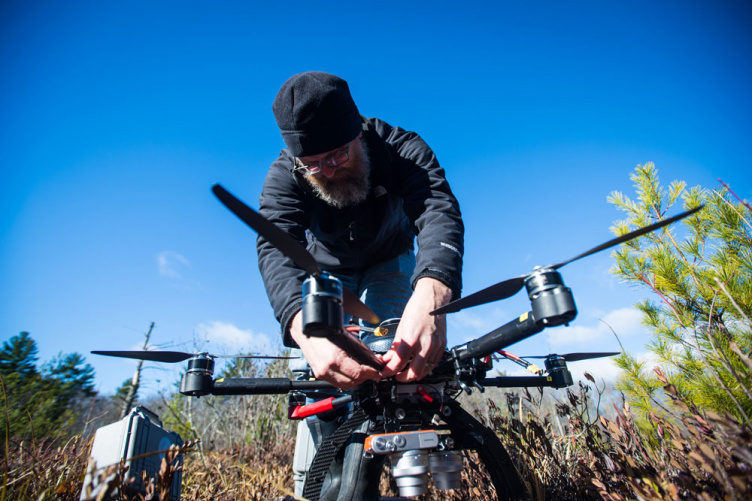
Michael Palace at work in the field.
“Music is everywhere. All you have to do is listen.” That’s the message from a musical prodigy in the critically acclaimed film “August Rush,” but the words could just as easily have been spoken by UNH’s Michael Palace.
An associate professor with joint appointments in the department of Earth sciences and the Institute for the Study of Earth, Oceans, and Space, Palace is not only an environmental scientist and researcher but also a composer and musician in his own right. His passion for music and sound has found a place right alongside his work in vegetation dynamics, landscape ecology, remote sensing and geospatial science.
Palace has played in bands, and while enjoying the social aspect of that, he says his true musical passion lies in electronic composition.

“I got my first synthesizer when I was 13 on the agreement that I would take piano lessons,” Palace says, sitting behind the desk in his Morse Hall office and smiling as he recalls that early passion for creating music and exploring sound.
His interest would evolve to include field recordings with a tape recorder back when he was a graduate student at the University of Virginia, and he still collects those field recordings today, even as the technology continues to evolve. “I put the microphone and recorder out and go away and do field work,” Palace says. Later, when he would retrieve the device, he’d have an hour’s recording of what was happening in the natural world while he was off working: bugs flying by, howler monkey cries, an unseen mammal sniffing at the microphone and, in one instance, cicadas coming closer, rolling across the landscape, their sound reminiscent of a locomotive roaring past.
“I record wherever I go,” Palace says. One of his recent albums was composed at the Stordalen Mire, where Palace and his team were recording acoustic methane ebullition as part of a project with Ruth Varner of the department of Earth sciences. “Last year, my field recording from the Amazonia was used in a new botanical exhibit at the Stuttgart Zoo,” he says.
His interest also led him to a course with the late Emeritus Professor John Rogers on computational and sound tools. “I write a lot of computer code,” Palace says. “The class was a great way for me to improve my programming skills that also helped me with scientific analysis.”
In 2004, Palace was signed to a German record label. “It was confirmation that someone else is supportive of your work,” he says, adding that also meant travel, with multiple performances — including one in Washington, DC, where many of his college friends attended even years after graduation.
Palace currently engineers and produces his own music — adding to his catalogue of dozens of albums over the past 20 years under the name Horchata. His albums range from compilations with multiple shorter songs to single-track titles where one song weaves a journey through 30 minutes or even an hour of music and sound. Palace also composed the background soundtrack to “Out of Balance,” a documentary about climate change.
His music has evolved over time. “I am really drawn to some ambient music,” he says. It’s something of a homecoming to the interest in sound and sound design he had in those early days with that first synthesizer. “Ambient allows me to create really unique sounds. Two years ago, I hacked an Xbox Kinect system and reprogrammed it to follow 28 joint movements of the body. With each movement came a change in pitch on a specific musical scale,” Palace explains. “Working with a professional dancer, we performed a collaborative improvisational piece along with another electronic musician at 3S Artspace in Portsmouth.

Those compositions and recordings also dovetail with his teaching. “I start class with a sound of the day,” he says, perhaps notes from the earliest clay recorder for a section on early humans or the call of a howler monkey for a lesson on Costa Rica.
Sound also connects with his research. Palace’s work identifying methane bubbles in water with Ruth Varner, professor of Earth sciences, began by listening via microphone while blowing bubbles in a paper cup through a coffee stirrer. “We listened, and we heard a bubble,” Palace says, and the pair now uses hydrophones to identify the presence of methane below the water and land surface of the Arctic Circle, providing important information to ongoing work related to climate change. Palace is also working with Dan Howard, assistant professor of biological sciences, in research on a particular type of cricket by using audio recording devices on a drone flying over the landscape.
“To have a passion outside of your normal job gives you an appreciation of other disiciplines,” Palace says, explaining it helps foster collaboration and truly interdisciplinary efforts. “Seeing your work have an impact on someone, that is the most thrilling thing.”
Hear Palace's most recent releases on iTunes and Spotify.
-
Written By:
Jennifer Saunders | Communications and Public Affairs | jennifer.saunders@unh.edu | 603-862-3585
















































